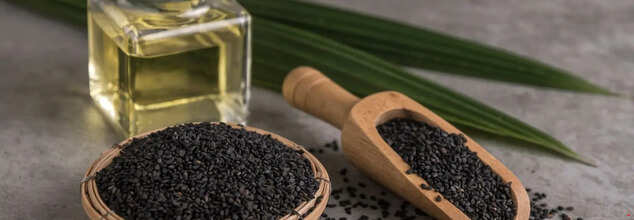- Health Conditions A-Z
- Health & Wellness
- Nutrition
- Fitness
- Health News
- Ayurveda
- Videos
- Medicine A-Z
- Parenting
- Web Stories

Credit: Canva
10 Ayurvedic Ways To Beat Seasonal Allergies
With pollen swirling through the air and weather transitions in full swing, this season can be particularly uncomfortable for those prone to allergies. Everyday elements that seem harmless—floating spores, dust particles, and even pet dander—can bring on an onslaught of sneezing, itchy eyes, and respiratory distress.
But what exactly are allergies, and why do they affect some individuals and not others? One person might cuddle with their dog for hours without a hint of discomfort, while another can’t come close to a puppy without triggering a sneezing fit. These reactions are the result of the immune system misidentifying harmless substances as threats and overreacting in an attempt to remove them.
Allergies typically fall into three main categories: food allergies, airborne allergies, and contact allergies. Whether it's something you eat, breathe, or touch, your body perceives the trigger as a harmful invader and launches an immune response, causing inflammation and irritation.
Ayurveda, the ancient Indian system of medicine, offers a holistic lens through which to understand allergies. According to Ayurvedic principles, allergies may arise from several root causes: inherited traits, weakened agni (digestive fire), an imbalance in one's dosha (vital energies), or the presence of ama (toxic undigested food). These imbalances disrupt the body’s natural defences and increase sensitivity to allergens.
To build resilience and prevent allergic flare-ups, Ayurveda suggests natural practices that cleanse the body and strengthen immunity.
10 Ayurvedic Approaches That May Help You Find Relief This Allergy Season:
1. Use a neti pot once or twice daily with a weak saline solution and distilled water. This helps clear out allergens lodged in the nasal passages and relieves the heaviness caused by excess kapha (earth and water energy).
2. Practice nasya, a technique that involves applying sesame oil infused with eucalyptus or camphor into the nostrils, ideally an hour after using the neti pot. This soothes the nasal tissues and provides a protective barrier.
3. Take trikatu, an herbal blend of black pepper, long pepper, and ginger, before meals to stoke the digestive fire and prevent the buildup of toxins.
4. Avoid kapha-aggravating foods such as dairy, sugar, wheat, red meat, processed items, and cold beverages. These can slow digestion and dampen agni.
5. Follow a kapha-reducing diet featuring warm, light, cooked foods. Emphasize seasonal vegetables, fruits, and simple meals cooked with ghee or olive oil to soothe mucus membranes.
6. Incorporate warming spices like ginger, cinnamon, turmeric, black pepper, and cumin in your cooking to boost digestion.
7. Sip on ginger tea throughout the day to stimulate agni and keep the digestive system active.
8. Take triphala at night, a blend of three fruits—amalaki, haritaki, and bibhitaki—that help detoxify and regulate digestion.
9. Practice pranayama (breathwork) techniques such as Dirgha, Ujjayi, Bhastrika, and Kapalabhati to enhance respiratory health and clear stagnant energy.
10. Exercise regularly to invigorate your metabolism and reduce ama. Choose activities that are fun and energising, whether it's yoga, walking, biking, or dancing.

Credits: Youtube/@ThePatientstory
Diagnosed At 7, Bedridden At 25, This Woman’s Battle With A Chronic Skin Condition Led To Something Inspirational
When Alana was just seven, she was diagnosed with psoriasis — a chronic autoimmune condition that left painful, scaly patches across her skin. By 25, her diagnosis expanded to include psoriatic arthritis, a debilitating condition that affects the joints and often hides in plain sight. Her story, however, is not just one of suffering — it’s a powerful testament to resilience, self-acceptance, and the ongoing battle for awareness around invisible illnesses. In a world obsessed with flawless appearances, Alana’s candid journey from being overmedicated to embracing a holistic lifestyle offers a much-needed spotlight on the realities of chronic skin conditions and the strength it takes to advocate for one’s body.
“I remember scratching until my skin bled,” Alana recalls. “Doctors didn’t know what was happening. My childhood became a blur of nurse’s office visits and topical creams.” Misunderstood and often misdiagnosed in its early stages, psoriasis is an autoimmune condition where the skin cells build up rapidly, forming scales and itchy, dry patches. In Alana’s case, the progression was swift and emotionally jarring.
By the age of nine, Alana was already on a restrictive anti-inflammatory diet. While other kids enjoyed sweets and processed snacks, she studied ingredient labels, became intimately familiar with holistic remedies, and avoided sugar like it was poison. “My mom would say, ‘Psoriasis feeds on sugar,’” she shares. “So while my siblings had Oreos, I had the sugar-free health store version—if I was lucky.”
Navigating adolescence with visible skin symptoms brought its own trauma. “Middle school was brutal,” Alana confides. “I wore arm socks and stacked bracelets just to hide my arms. I’d wear wigs to hide my scalp. There were days I couldn’t even look at myself in the mirror.”
Like many who live with psoriasis, Alana also faced the psychological burden—body image issues, bullying, and feelings of shame that often go unseen in clinical narratives. “No one talks about the depression that comes when you’re in remission. Your skin is clear, but emotionally, you’re still healing.”
What is Psoriatic Arthritis?
At 25, just as Alana thought she had a handle on her condition, she experienced her first flare-up of psoriatic arthritis—another autoimmune condition closely tied to psoriasis. “I couldn’t walk for a week. I was terrified,” she remembers. “But my dad, who has it too, told me—‘This is how it starts. Buckle up.’”
Psoriatic arthritis is marked by inflammation of the joints, often developing years after skin symptoms appear. It adds a layer of physical disability to an already taxing disease and affects nearly 30% of people with psoriasis. For Alana, it meant another upheaval—mentally, physically, and emotionally.
Psoriatic arthritis is a form of arthritis that affects individuals with psoriasis, a condition that causes red, scaly patches on the skin. While psoriasis typically develops first, in some cases, joint issues appear before skin patches or simultaneously. The condition is marked by joint pain, stiffness, and swelling, which can affect any part of the body, including the fingers, toes, and spine. Psoriatic arthritis varies in severity, with disease flare-ups alternating with periods of remission.
Over the years, Alana tried it all—steroids, topical creams, biologics, cortisone injections. “Steroids helped, but the more I used them, the thinner and more fragile my skin became. It got worse in the long run.” Like many patients, she experienced the rollercoaster of temporary relief followed by long-term setbacks.
A biologic medication gave her a temporary reprieve from flare-ups, allowing her to enjoy a rare period of skin clarity. “It was my party girl era. My skin was clear, I felt normal, but the side effects were awful—migraines, nausea, and daily pills.”
Ultimately, the fear of long-term side effects led Alana to quit biologics in 2018. With that decision came a resurgence of symptoms—but also, a shift in mindset.
Alana decided she would no longer hide. “I thought, so many people have skin conditions. Why should I be ashamed?” She began sharing her story on social media. To her surprise, her vulnerability resonated. “One day a brand reached out for a skincare campaign. Next thing I know, I’m on billboards.”
For someone who once layered bracelets to hide her skin, it was a full-circle moment. “If I could go back and show my 7-year-old self—the goth little girl in all black—these pictures, I’d tell her, you’re going to be okay. You’ll help others one day.”
Symptoms of Psoriatic Arthritis
Psoriatic arthritis is a chronic disease that progressively worsens over time, though there are periods when symptoms improve or temporarily disappear. The key symptoms include:
Swollen Fingers and Toes: Often described as painful, sausage-like swelling in the fingers and toes.
Foot Pain: Pain in the areas where tendons and ligaments attach to bones, such as the Achilles tendon and the soles of the feet.
Lower Back Pain: This is caused by spondylitis, which inflames the joints between vertebrae and in the spine-pelvis region.
Nail Changes: Psoriatic arthritis may cause nails to form small dents, crumble, or separate from the nail beds.
Eye Inflammation: Uveitis causes eye pain, redness, and blurry vision, and if untreated, it can result in vision loss.
In 2019, Alana made a dramatic switch to a vegan lifestyle. “I left a dermatologist appointment in tears because I didn’t want to go back on meds. That day, I cut everything—dairy, meat, processed foods—cold turkey.” She admits now that she wasn’t fully informed. “I dropped to 100 pounds. I was frail. I didn’t know how to nourish my body properly.”
Still, her holistic journey taught her what worked—and what didn’t. Through trial and error, cookbooks, and community forums, she carved a path rooted in listening to her body. “There’s no one-size-fits-all with psoriasis. What helps one person might trigger another.”
Today, Alana continues to live with both psoriasis and psoriatic arthritis. She still faces flare-ups, but she’s better equipped mentally, emotionally, and socially. “This disease doesn’t define me. It’s part of my story, not the whole story.”
Her message to others? “Don’t let shame win. Find your community. And know that healing isn’t just about clear skin—it’s about acceptance, too.”
Alana’s journey highlights the often-hidden aspects of chronic skin conditions—misdiagnosis in childhood, the emotional toll of visible symptoms, the physical limitations of psoriatic arthritis, and the long, non-linear road to healing. As public conversations around autoimmune diseases and skin positivity grow, stories like hers are critical reminders that healing is just as much about self-love as it is about science.

Credits: Canva
Male Menopause: Is Andropause A Reality Or A Myth?
Hormone changes are a natural part of aging, but they affect men and women differently. In women, menopause marks the end of fertility and involves a sharp decline in reproductive hormones over a relatively short period. For men, the hormonal shift is slower and more gradual. This has led to the popular but misleading idea of a “male menopause.”
Debunking the Male Menopause Myth
The term “male menopause” is often used in media and casual conversations to describe aging-related hormone changes in men. But unlike female menopause, men do not experience a sudden stop in hormone production.
Instead, testosterone—the primary male sex hormone—declines slowly, about 1% per year from around age 30 or 40. This gradual process is medically referred to as late-onset hypogonadism or age-related low testosterone. It’s not inevitable, and not all men experience symptoms.
What the NHS Says
According to the NHS, some men in their late 40s to early 50s experience symptoms such as:
- Low libido and erectile dysfunction
- Mood swings and irritability
- Reduced muscle mass and exercise capacity
- Fat accumulation, including belly fat or “man boobs” (gynaecomastia)
- Fatigue and sleep issues
- Poor concentration and short-term memory
These symptoms may be similar to those seen in menopause, but the causes are often more complex and not always hormonal.
Causes Beyond Hormones
The NHS cautions against labeling these changes as “male menopause,” since many symptoms stem from lifestyle, psychological, or social factors, not just hormones. Stress, anxiety, depression, poor diet, lack of sleep, and inactivity can all contribute.
For some men, this period may coincide with a "midlife crisis," marked by career worries, relationship stress, or existential concerns. These factors can affect emotional well-being and physical health—sometimes mimicking hormone-related symptoms.
When It Is Hormonal
In fewer cases, symptoms are linked to a genuine medical condition called late-onset hypogonadism, where the testes produce insufficient testosterone. This can occur due to:
- Obesity
- Type 2 diabetes
- Certain medications (like opioids)
- Pituitary gland issues
Hypogonadism can be diagnosed through blood tests and medical evaluation. It is not considered a normal part of aging.
Recognizing Symptoms of Low Testosterone
Men with clinically low testosterone may experience:
- Decreased sexual desire or erectile issues
- Hot flashes or sweating
- Breast tenderness
- Loss of bone density or height
- Fatigue, low mood, or reduced motivation
- Sleep disturbances
- Decreased muscle mass and increased body fat
Because these symptoms are non-specific, doctors recommend testing only when multiple signs are present.
Treatment Options and Risks
If testing confirms low testosterone, and lifestyle factors are ruled out, testosterone therapy may be considered. Guidelines vary:
The American College of Physicians recommends it for men with sexual dysfunction who want to improve performance.
The Endocrine Society supports therapy for men with symptoms and confirmed low levels.
However, therapy comes with risks, such as increased chance of heart problems, blood clots, prostate or breast cancer, and infertility.
What You Should Do
If you’re experiencing troubling symptoms, talk to your GP. They may explore emotional or lifestyle causes first. Treatment could include therapy, stress management, diet, exercise—or in some cases, hormone testing.

Credits: Canva
Are You Able To Thrive On Just 4 Hours Of Sleep? This Rare Gene Mutation Might Be Why
I’ve never needed much sleep to feel refreshed. While most of my friends groan without their full 8 hours and reach for coffee before conversations, I’ve always felt perfectly fine—sometimes even better—after just four or five hours of shut-eye.
For years, I had thought that I was merely the "odd one out," a person with an offbeat sleeping pattern always harming my body maybe but now it appears, there could be a genetic explanation for why individuals like myself are programmed this way. Scientists found a rare gene mutation in a gene known as SIK3 that enables some of us to function just fine on less sleep. No drowsiness. No foggy brain. No side effects.
If you’ve ever wondered why some people seem superhuman on minimal sleep, or secretly hoped there was a way to train your body to do the same, this discovery might just hold the answers. Let’s explore what makes natural short sleepers tick—and whether this sleep “superpower” is something the rest of us can unlock too.
For years, sleep specialists have repeated the same mantra: adults require a minimum of 7 to 9 hours of quality sleep each night to maintain mental acuity, immune function, and cardiovascular health. Long-term sleep deprivation has long been associated with higher risks of obesity, Alzheimer's disease, high blood pressure, and even premature death. But what if some people are genetically predisposed to perform best on only four hours of sleep?
Recent scientific studies have put this astounding phenomenon under the limelight with a stunning finding: an exceptional gene mutation, SIK3-N783Y, that makes some individuals what scientists have coined as natural short sleepers.
Who Are These Super Sleepers?
A natural short sleeper (NSS) is one who sleeps four to six hours every night but wakes up feeling refreshed and ready to go—without the help of coffee or the typical symptoms of sleep deprivation. They are not sleep-deprived; their bodies simply need less sleep than others.
This fascinating sleep pattern has puzzled scientists for decades, but thanks to a recent study by researchers from the Chinese Academy of Sciences, the enigma is starting to lift. Their results, which were published in a peer-reviewed journal, indicate a rare gene mutation in the salt-induced kinase 3 (SIK3) gene.
Can You Really Survive—and Thrive on Just 4 Hours of Sleep?
The scientists discovered that the N783Y mutation in the SIK3 gene alters the SIK3 protein structure. This alteration affects the protein's function to transfer phosphate molecules, an essential component of the chemical signaling that governs our internal sleep-wake cycles.
In order to better analyze this effect, researchers created genetically modified mice that had the same mutation. Such mice slept around 30 minutes less per night than regular mice, and even less when deprived of sleep. Surprisingly, these differences weren't associated with the amount of proteins in the brain—but rather, with the way the proteins worked.
Furthermore, mutant mice had higher delta wave activity on EEG readings—a sign of deep, restorative sleep. This reinforces the theory that the mutation doesn't merely cut short sleep, it makes it more effective.
This is not the first time that scientists have associated genetics with sleep duration. Several years back, one mother and daughter who claimed to require just six hours of sleep at night without ever getting tired were discovered to carry a mutation in a gene linked with the circadian clock, our internal sleep- timing mechanism.
So far, scientists have discovered at least five mutations in four genes that affect sleep duration. But the newly found SIK3 mutation is particularly intriguing because it directly affects biochemical pathways that can now be targeted in the future development of drugs.
How Does this Gene Affect Sleep Medicine?
The applications of this research are vast. By knowing what enables natural short sleepers to feel rested on less time, researchers can start working on the development of treatments to improve sleep quality—not by lengthening time, but by increasing the efficacy of the hours we do spend sleeping.
"This discovery deepens our knowledge of the genetic basis of sleep," researchers said, highlighting the mutation's promise in leading to precision sleep medicine—focused treatments that modify sleep regulation systems at the molecular level.
Natural Short Sleep vs. Sleep Deprivation
Natural short sleep is a genetically controlled, rare condition in which people perform best with only 4–6 hours of sleep. In contrast to sleep-deprived individuals, they rise feeling rested, with no hint of exhaustion or mental slowness. This is not about "toughing it out" on fewer z's—it's simply the way their bodies are biologically programmed to require less. Sleep deprivation has an impact on mood, memory, immunity, and cardiovascular health. Long-term sleep deprivation has been known to increase disease risks like Alzheimer's or cardiovascular disease. Thus, when natural short sleepers are prospering, the rest of us should not try to replicate their sleep.
Why Most People Still Need 7 to 9 Hours of Sleep?
Most people still require 7 to 9 hours of sleep because it maintains critical functions such as memory consolidation, emotion regulation, immune function, and cell repair. Sleep removes toxins from the brain and re-sets the body's biological clocks for the day ahead. Sleeping less than required on a regular basis can hamper concentration, decision-making, and metabolism and result in long-term dangers including obesity, cardiovascular disease, and dementia. Although a small group of people have a genetic mutation that enables them to survive on less sleep, the rest of us are not so hardwired and require sufficient sleep to maintain physical, mental, and emotional health.
Why You Shouldn't Deprive Yourself of Sleep?
Before you begin reducing your sleep time, it's important to observe, natural short sleep is different from sleep deprivation. The majority of us cannot just train ourselves to be short sleepers. For most people, trying to sleep just four hours a night results in cognitive impairments, memory loss, compromised immunity, and long-term health problems.
Rather than copying the sleep habits of the genetically fortunate few, experts advise taking efforts at sleep hygiene:
- Stick to a regular sleep schedule, even on weekends.
- Avoid caffeine and heavy meals in the evening.
- Make the sleeping environment cool, dark, and quiet.
- Limit screen use before bedtime.
- Deal with stress through meditation or journaling.
While the discovery of the SIK3-N783Y mutation may not mean much for your sleep schedule today, it opens exciting doors for future treatments and a deeper understanding of how our bodies regulate rest. It also highlights the fascinating diversity of human biology—some people are literally wired to need less sleep, and now, we’re beginning to understand why.
So, if you wake up feeling great on only a few hours of sleep each night, science may one day validate that you're one of a select, genetically privileged few. In the meantime, shoot for that 7-9 hour mark your body and mind will appreciate it.
© 2024 Bennett, Coleman & Company Limited




